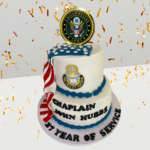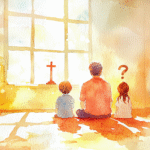
David Tingley
David Tingley is a Ph.D. student in Biblical Studies/New Testament at Asbury Theological Seminary in Kentucky, where he and his wife, Alexis, live with their three young kids. He also teaches Bible classes online as an adjunct professor at Crown College in Minnesota.
By David Tingley
Often, when I’m so busy studying God’s Word (and many other things) as part of my Ph.D. work in biblical studies, I lose sight of His presence. But recently, the Lord reminded me of His reality and of the work He is still doing through His Spirit, His church, and the power of His gospel. By giving my time to work on a neighbor’s bike, I was given an image of the work Jesus is still doing in our midst, and for that I am grateful. Jesus’ work is not limited to Bible times; through His Spirit, He is still working “to this very day” (John 5:17). Here’s the story:
As a side job, I like to help people in my neighborhood by repairing and maintaining their bikes. When a neighbor recently showed me his son’s bike that somehow had a twisted chain (I still don’t know how that happened), I went to my local bike shop and discovered a tool known as a “chain breaker.” By aligning this handy tool with a bike chain and turning its knob, a chain breaker drives out the pin on a particular chain link and — you guessed it — breaks the chain. This I was able to do with my neighbor’s son’s bike and voila, no more tangled chain.
But breaking the twisted bike chain was only half the job; the chain still had to be remade. After attempting in vain to fix it with a rather expensive “quick link” designed to snap a chain back together, it occurred to me that maybe — just maybe — my chain breaker could also be used as a chain maker. Fortunately, I had a spare chain link to set in place and, using the chain breaker, I was able to reverse the chain-breaking process and remake the chain so my neighbor’s son could get out riding again. Discovery: my chain breaker is also a chain maker!
_
“Jesus, I was reminded that morning, is a chain breaker.”
_
Jesus Breaks Chains — and Makes New Ones
A couple of days later, my wife and I attended a new members class at our church in Nicholasville, Kentucky. There, we heard person after person share stories of broken addictions as the result of turning to Jesus. From depending on alcohol and drugs to neglecting family in pursuit of distractions, from sexual confusion to debilitating anxiety and dead religion, these people described the chains holding them back and destroying their relationships. But each one of them, having hit their own rock bottom, also described how they turned to Jesus, gave Him their chains, and He broke them. Jesus, I was reminded that morning, is a chain breaker. For that reminder, I am thankful.
All this talk of broken chains may bring to your mind the words of a rather famous Charles Wesley hymn. In the fourth stanza in Wesley’s famous hymn “And Can It Be,” a singer declares in response to the light of the Lord’s “quickening ray” that, “My chains fell off, my heart was free; I rose, went forth, and followed Thee.” In this hymn, Wesley celebrates the chain-breaking work of Jesus but also reveals the purpose of this work: to rise, go forth, and follow Him.
In our own rising and going forth, my wife and I committed to membership in our local church— a former United Methodist congregation in a season of discernment about the church’s direction and focus, with a strong commitment to God’s Word and ways in their Wesleyan expression. In the process, we discovered not only that Jesus is a chain breaker, but also that He is a chain maker. Listening to our newfound church brothers and sisters tell their stories, we couldn’t help but be drawn to them through our common experience of the powerful grace of Christ. The same Jesus who breaks chains in our lives also makes new chains of friendship and commitment in the local church — a living example of my bike work a couple of days earlier.
_
“Jesus broke chains of idolatry and made chains between believing brothers and sisters.”
_
The Testimony of Scripture, Revival, and Us!
The image of Jesus breaking chains — and making new ones — is not new. In first-century Thessalonica, a Greek city where the gospel had spread, Jesus broke chains of idolatry and made chains between believing brothers and sisters.
The Apostle Paul testifies about this in 1 Thessalonians 1:9, writing that the believers there had “turned to God from idols to serve the living and true God.” These words validate the report given in Acts 17:4 that some members of the synagogue in Thessalonica were persuaded by the message about Jesus “and joined Paul and Silas, as did a large number of God-fearing Greeks and quite a few prominent women” (NIV).
A few verses later, this chain-breaking, chain-making work of Jesus is called “turning the world upside down” (v.6 NRSV). By turning away (and helping others turn away) from idols —including those associated with the cult of the Roman emperor himself, which was so pervasive in the Greco-Roman world of the first century — the apostles and followers of Jesus in Thessalonica were “all acting contrary to the decrees of the emperor, saying that there is another king named Jesus” (v.7 NRSV). Chains of idolatry and even of religion were broken in Thessalonica, only to be remade in the form of Christian community. Jesus did then what He’s still doing today.
_
“I was reminded of the reality of Jesus’ chain-breaking, chain-making presence.”
_
Lest we forget the years between Bible times and ours, more of Charles Wesley’s hymns, written in the trenches of the 18th century Methodist Revival in England, testify to the chain-breaking, chain-making work of Jesus. A lesser-known collection of 56 “Hymns for Christian Friends,” which Wesley wrote as part of the second volume of his “Hymns and Sacred Poems” upon his engagement to Sarah Gwynne in 1749, lyrically celebrates the chains of Christian friendship forged in the Methodist revival (John R. Tyson, Assist Me To Proclaim [Eerdmans, 2008], ix).
Often these chains of Christian friendship were the result of broken chains of sin in people’s lives. Simply stated, these hymns demonstrate what God does in Christian friends and out in the world through them; the hymns also show how Christian friends offer their relationship up to the Lord and look around to serve each other. One brief example is Hymn #52, in which worshippers sing of broken chains, of being “freed from sin below” as the truth “we all shall know.” They also sing of new chains in the form of Christian companions who together are “wholly sanctified, we all His witnesses shall be” (v.7).
I too am His witness. In the convergence of my bike work and church meetings, of the truth of Scripture and the testimony of Charles Wesley’s quill, I was reminded of the reality of Jesus’ chain-breaking, chain-making presence. And for that I am thankful. Would you join me in such testimony and thanksgiving, through your own (and your local church’s) witness of Jesus’ chain-breaking, chain-making power? “We all his witnesses shall be.”
+

David Tingley
David Tingley is a Ph.D. student in Biblical Studies/New Testament at Asbury Theological Seminary in Kentucky, where he and his wife, Alexis, live with their three young kids. He also teaches Bible classes online as an adjunct professor at Crown College in Minnesota.









